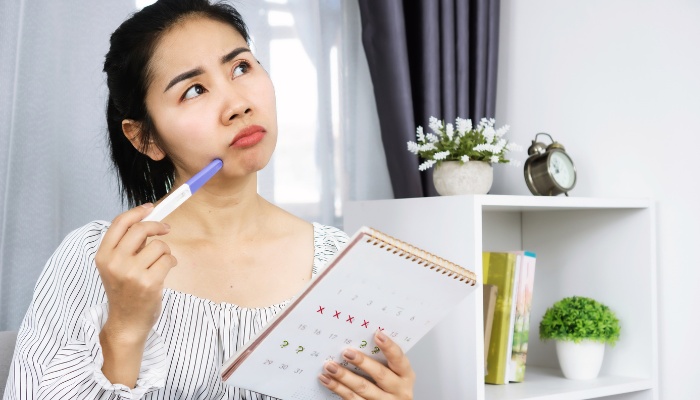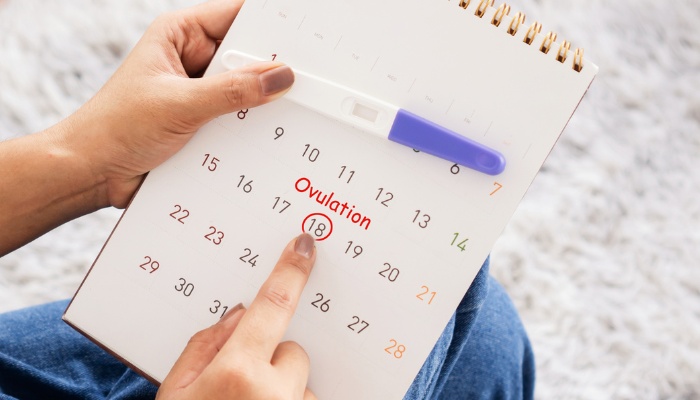If you are attempting to get pregnant and monitoring your menstrual cycle, you are probably being attentive to any bodily changes and eagerly anticipating the moment you will be able to recognize your pregnancy.
Typically, HCG levels are not high enough to produce noticeable pregnancy symptoms until 11-14 days past ovulation. Any early symptoms experienced will be very faint and difficult to differentiate from normal PMS or ovulation symptoms. A missed period will be the first true indicator of pregnancy.
The two-week waiting period (TWW) between ovulation and your next period can seem endless.
Let’s talk about some signs and symptoms that might be able to give you a clue into whether or not you have conceived this cycle.
DPO Symptoms
In the days following ovulation, you may find yourself getting anxious and impatient as you wait to take a pregnancy test.
Every twinge or pain in your body will make you question if it is a symptom or not.
If you have conceived, there is a lot that goes on inside your body between 1 and 14 DPO. It is possible that these changes may cause physical symptoms.
0-6 Days Post Ovulation (DPO)
If you’ve conceived this cycle, there will be a lot going on inside of your body during the first six days past ovulation as your body prepares for implantation and pregnancy.
What’s Happening Internally
After the egg has been fertilized, it travels through the fallopian tubes and attaches to the uterine lining. This process is called implantation.
Implantation usually occurs six to 10 days after ovulation and can last for a few days. Once the egg has implanted, you may slowly begin to notice symptoms as your body prepares for pregnancy.
Your body will begin to undergo a lot of hormonal changes that are responsible for the early pregnancy symptoms many women experience.
Possible Symptoms
A lot of women do not notice pregnancy symptoms this early on; however, it is possible to notice that you feel a little off. These are some early changes that you may notice at six days past ovulation:
- Breast tenderness
- Food cravings
- Headaches and dizziness
- Fatigue
7-11 Days Post Ovulation (DPO)
You may still not notice that you are pregnant 7 DPO, but you might notice that you don’t feel the way you usually do.
If you’ve been pregnant before, you might have an idea of what is going on. However, those who haven’t been pregnant before may think that 7 DPO symptoms are related to something else.
What’s Happening Internally
What exactly is going on inside of your body during the second week of pregnancy? Usually by this time, the fertilized egg has implanted and has developed into a blastocyst.
This ball of cells is what will become the embryo and, later, the fetus. At this stage, the cells are dividing rapidly, and your body is undergoing large hormonal shifts to support pregnancy.
Possible Symptoms
Hormone fluctuations happening days 7-11 DPO can affect other parts of your body and result in early tell-tale signs of pregnancy including:
- Cramps and bleeding
- Mood swings
- Breast tenderness
- Sensitive nipples
- Headaches
12-14 Days Post Ovulation (DPO)
If you are trying to conceive, 14 DPO is a big milestone! It marks the end of the long 2-week wait period before you can take a pregnancy test.
If you are still in between day 12 and 14 DPO, keep reading to learn about what might be going on inside your body and what symptoms you might be experiencing.
What’s Happening Internally
If you have conceived, you are experiencing hormone surges at this point as your body is ensuring everything is in place for a healthy pregnancy.
Your implanted blastocyst is still dividing and will shortly develop into an embryo.
Possible Symptoms
It is perfectly normal not to notice any symptoms this early on, and it may be difficult to differentiate between pregnancy symptoms and normal PMS.
However, if you are sensitive to your body’s normal changes during your cycle, you might have a clue that you are pregnant by some of these symptoms:
- Cramping
- Fatigue
- Late period
- Breast swelling
- Nausea or morning sickness

Earliest Time To Take Pregnancy Test
For many at-home pregnancy tests, you can get a positive result as early as 10 days past conception, or 10 DPO.
However, for the most accurate results, you should follow the general rule of waiting two weeks after ovulation, or until you have a missed period, to take a pregnancy test.
Average DPO for Positive Pregnancy Test
The average day to get a positive pregnancy test is 14 DPO if you have a regular, 28-day cycle. This is typically when there is enough HCG hormone in your urine to get an accurate reading.
What DPO Does Implantation Occur?
Implantation may happen as early as 5-6 DPO, but research shows that it occurs between 8 and 10 DPO in most successful pregnancies.
3 DPO Symptoms
At 3 DPO, it is still too early to tell if you are pregnant or not. At this time, an egg may be fertilized, but it has not yet implanted.
You will likely not experience any significant symptoms that will lead you to believe you have conceived. The first possible bout of symptoms will not happen until after implantation.
At 3 DPO, you may feel extra bloated, fatigued, and possibly a little crampy — all of which are normal symptoms associated with ovulation and would happen regardless due to hormone changes that happen during the luteal phase.
3 DPO Discharge if Pregnant
You may notice an unusual discharge at 3 DPO. It is usually white or yellow and sticky. While this could be a normal ovulation symptom, it could possibly be a very early sign of pregnancy.
5 DPO Symptoms
Unfortunately, 5 DPO is still too early to test for pregnancy, and it is likely that implantation has still not occurred by this time.
If you are extra antsy and the TWW (two-week wait) time is dragging on, there are some extremely early pregnancy symptoms you can look for if you want.
I would be careful, however, because many of them are typical ovulation symptoms that can easily be mistaken for pregnancy symptoms.
- Nausea
- Mood swings
- Food cravings
7 Days After Ovulation Symptoms
At 7 DPO, you are halfway through the TWW! Congratulations! If you are paying extra close attention to your body, you may be questioning every pain or discomfort wondering if it is a pregnancy symptom.
There are some 7 DPO symptoms that end in a positive pregnancy test, but it is not a guaranteed way of telling if you are pregnant or not.
This is because 7 DPO symptoms are very similar to your usual menstrual cycle symptoms.
It’s also worth remembering that 7 DPO is still the very early days, and it is likely that you will not experience any symptoms. Some possible symptoms include:
- Cramping
- Spotting
- Breast sensitivity
- Headaches
- Nausea
- Extra gas
- constipation
8 DPO Symptoms
By this time, implantation may have already occurred, but it is not a sure thing. Eight DPO is right in the middle of the implantation window between six and 12 DPO.
There is a chance that you might experience mild implantation cramps and spotting if implantation has occurred.
Related Questions:
How Many Days After Ovulation Does Implant Bleeding Occur?
Implantation bleeding is light bleeding or spotting that usually occurs sometime between 10 and 14 DPO after the fertilized egg has implanted into the uterine lining.
This type of bleeding is usually very minimal and short-lived.
How Long After Implantation Does HCG Rise?
HCG levels begin to rise immediately after implantation signals to your body that it is pregnant.
Small amounts of HCG can be detected in your urine as early as 8 DPO if implantation has occurred. Usually, 11-14 DPO, HCG levels are high enough to start causing early pregnancy symptoms.
Wrapping It Up
While waiting until after your missed period is the surest way to determine if you are pregnant, I understand that it is not the easiest thing to do.
Those days in between ovulation and testing can feel endless, and it is easy to drive yourself crazy wondering if you are experiencing a symptom of pregnancy or not.
Just remember that while symptoms are possible that early on, it is not likely that you will feel anything very noticeable.
Charlynn is an educator and mom to fraternal boy/girl twins. She loves learning through the experiences she has with her littles and using her knowledge to help other moms as they embark on the journey of motherhood.

